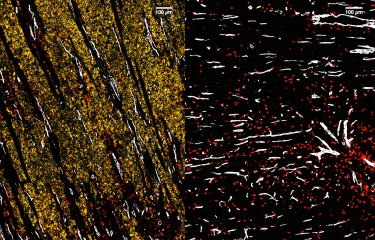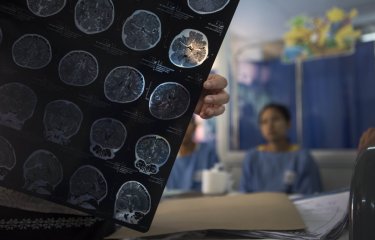A recent study has demonstrated that pneumococci bring about a lasting change in a protein related to DNA, influencing the gene expression of some lung cells. Even after the bacteria have been eliminated, this change lasts for several days, making cells more tolerant to future infections.
The estimated length of all the DNA in the human body, if it were unraveled and placed end to end, is 60 billion kilometers, or 400 times the distance from the Earth to the Sun. The two meters of DNA contained in each cell are condensed into a nucleus measuring 5 to 10 micrometers in diameter (to place that in context, the diameter of one strand of hair is around 50 micrometers). How can our DNA fit into such a small nucleus? The answer is that it is packaged into chromatin, a complex structure composed of nucleic acids and proteins. Some of these proteins, molecules known as histones, serve as spools around which DNA is wrapped. They play a key role in compacting our genetic material.
Changes that last even after pneumococci are eliminated
Histones also play an essential role in regulating gene expression. Genes are less accessible to molecules involved in transcription (the synthesis of RNA from DNA) if chromatin is more condensed. So histone modifications, also known as epigenetic mechanisms, affect the level of gene expression and therefore also influence cell metabolism.
In a recent study, scientists from the Institut Pasteur studied Streptococcus pneumoniae, bacteria also known as pneumococci that naturally colonize cells in the respiratory epithelium. In fragile individuals, pneumococci can become pathogenic and cause pneumonia, meningitis and ear infections. The scientists demonstrated that pneumococci chemically modify histones, affecting the level of expression of hundreds of genes and altering cell physiology. Surprisingly, they found that even when the pneumococci were eliminated with antibiotics, the modification remained. "Our research confirmed that the epigenetic mark is conserved for at least nine days after infection, even in the total absence of bacteria. It is even possible that the mark may last for several weeks, but that has yet to be demonstrated," explains Mélanie Hamon, Head of the Chromatin and Infection Unit.
Making cells more susceptible to future infection
What are the consequences of the fact that pneumococcal infection causes lasting changes to our cells? The scientists provide us with some answers. "Like smoking, pneumococci change cell epigenetics. The epigenetic mark they leave creates a kind of memory that changes the way in which cells interact with bacteria," explains Mélanie Hamon. The lead author, Christine Chevalier, points out that "modified cells respond differently to subsequent infection and become more susceptible to bacterial adhesion." In other words, the cells in the lung epithelium are weakened by a first pneumococcal infection.
Although many questions still remain, this study is a clear illustration of the complex interactions between cells and microbes. It also shows that a seemingly mild infection is capable of influencing our future health. Finally, the research paves the way for novel therapeutic strategies aimed at preventing histone modification and alterations in the level of gene expression in our cells.
Source : Epithelial cells maintain memory of prior infection with Streptococcus pneumoniae through di-methylation of histone H3, Nature communications, July 2, 2024
Christine Chevalier1, Claudia Chica2, Justine Matheau1,3, Adrien Pain2, Michael G. Connor1 & Melanie A. Hamon1
1 Institut Pasteur, Université Paris Cité, Chromatin and Infection Laboratory, F-75015 Paris, France.
2 Institut Pasteur, Université Paris Cité, Bioinformatics and Biostatistics Hub, F-75015 Paris, France.
3 Bio Sorbonne Paris Cité doctoral school, Department of Infectiology Microbiology, Université Paris Cité, F-75006 Paris, France.





